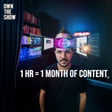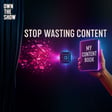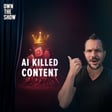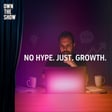
From Marketing Automation to AI: Andre Yee's Vision for the Future
In this episode of the AI-Driven Marketer, Dan Sanchez sits down with Andre Yee, the founder of Tiga AI and former CEO of Triblio, to talk about the transformative power of AI in sales and marketing. Andre offers his seasoned perspective on the potential of AI to redefine prospecting through signal discovery, its influence on job automation, and the future of work culture in the rapidly evolving digital landscape. They also tackle the specifics of how Yee's company utilizes AI to parse data from various channels and set the stage for generative AI's significant impact on entrepreneurial success. For insights on upscaling your sales and marketing skills in an AI-centric world and predictions on how AI could usher in the era of the solopreneur unicorn, make sure to tune into this thought-provoking conversation.
Timestamps:
05:41 Marketers must differentiate demand creation, demand capture.
08:16 Spot on: demand capture is key for companies.
11:56 Generative AI extracts signals from unstructured data.
15:18 AI sales assistant autonomously performs signal-based prospecting.
18:04 Commercial beta testing for generative AI in sales.
20:35 LinkedIn post distinguishes prompting and prompt engineering.
24:52 New jobs will require engineering and AI.
29:02 Anticipating disruption from SAS in podcast industry.
33:47 Cheap capital can lead to market inefficiency.
35:07 Marketing evolving to focus on demand creation.
40:15 Evangelize the problem: addressing overpromised intent data.
43:06 Authenticity and self-awareness key in marketing.
47:22 Direct advice for marketers in changing climate.
50:02 Efficiency in engineering process for marketing operations.
52:20 AI and marketing focus on content creation.
54:33 Moving work up the value stack with AI.
57:37 Thanks for joining the podcast conversation, Andre.



![What’s Your Authority Score? [The 5-Factor Test] image](https://media.zencastr.com/cdn-cgi/image/width=112,quality=85/image-files/630c9f06819f8b3dba5fa460/cfbaccba-f587-45de-a41f-e2c99c15e2a5.png)
![The Audience Growth Engine [Full Framework] image](https://media.zencastr.com/cdn-cgi/image/width=112,quality=85/image-files/630c9f06819f8b3dba5fa460/46b84fd1-e856-4687-9aee-6b4a7e0bc7ff.png)


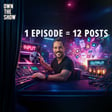
![The "Dream 100" Execution Plan [Google Sheet System] image](https://media.zencastr.com/cdn-cgi/image/width=112,quality=85/image-files/630c9f06819f8b3dba5fa460/fcd89374-76a4-4e58-a2e3-2bb7ddda4364.png)
